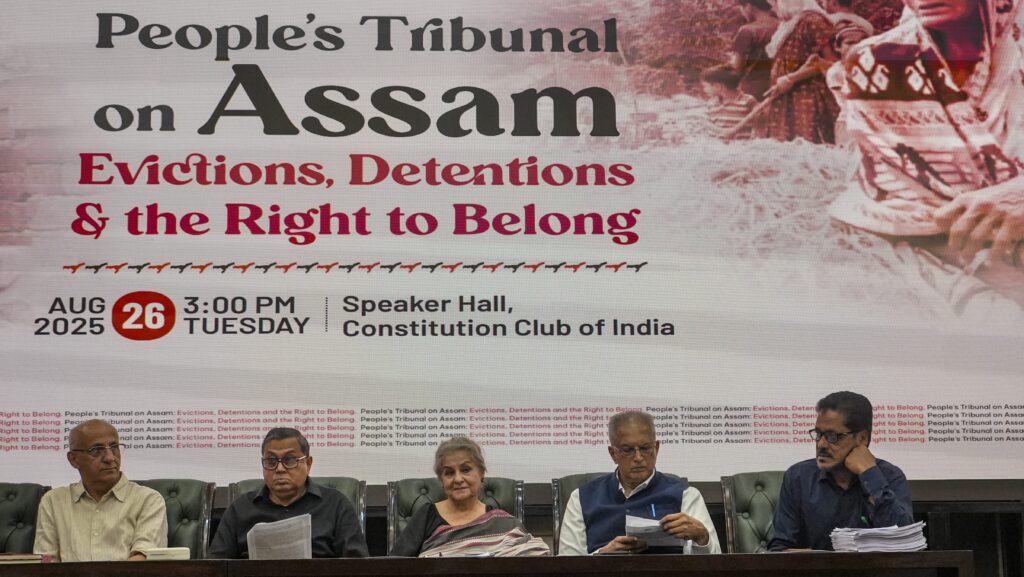A former member of the erstwhile Planning Commission under the UPA government, Syeda Saiyidain Hameed, has drawn criticism from BJP leaders for saying Bangladeshis are also people and should be allowed to come to India, and that Allah had created the Earth for human beings.
“What is the crime in being Bangladeshi? Bangladeshis are also people. The world is so big that Bangladeshis can also be here… They are humans. Allah has made this Earth for humans,” Hameed said on Sunday in Assam.
She was in the state as part of a delegation that also included former Chief Information Commissioner Wajahat Habibullah, lawyer Prashant Bhushan, activist Harsh Mander and former Rajya Sabha member Jawhar Sircar. The delegation visited a site in Goalpara where the Assam government recently conducted an eviction drive. On Sunday, they participated in a public meeting in Guwahati held by the Axom Nagarik Sanmilan, where Hameed made the remarks.
Assam Chief Minister Himanta Biswa Sarma and Union Minister Kiren Rijiju attacked her while also drawing attention to her proximity to the Nehru-Gandhi family. “People like Syeda Hameed, a close confidante of the Gandhi family legitimise illegal infiltrators, as they seek to realise Jinnah’s dream of making Assam a part of Pakistan,” Sarma said on X Monday.
“Misleading in the name of humanity. It’s about our land and identity. Why are minority Buddhists, Christians, Hindus and Sikhs persecuted in Bangladesh and Pakistan? Syeda Hameed may be close to Sonia Gandhi and Rahul Gandhi, but shouldn’t support illegal migrants,” Rijiju said on Monday.
Sarma on Sunday also claimed that the Congress, Jamaat-e-Islami-Hind, intellectuals like Harsh Mander and Prashant Bhushan and some elements in Pakistan and Bangladesh are working to weaken the state. “Harsh Mander and Prasant Bhushan have been visiting different places since yesterday. Another group of similar people, including Jawhar Sircar, Wajahat Habibullah and Fayaz Shaheen are also touring lower Assam districts. They are only meeting leaders of the minority community and Jamaat-e-Islami in Assam to create an atmosphere of unrest,” Sarma said.
The Congress, under constant attack in Assam from Sarma and facing an Assembly election next year, also distanced itself from Hameed’s comments, with party leader and former Lok Sabha MP Udit Raj saying India was not “a grazing ground for people from Bangladesh and Pakistan to come and settle”.
Who is Syeda Hameed?
Hameed was born in 1942 to K G Saiyidain, who served as Education Secretary in the 1950s under Maulana Azad as minister. Her mother belonged to the erstwhile royal family of Rampur in Uttar Pradesh.
Hameed grew up in Delhi and, after graduating from Miranda House college of the University of Delhi, continued higher education in universities in the United States and Canada.
After a brief teaching stint at Lady Shri Ram College in Delhi, Hameed lived in Canada from 1967 to 1984, where she obtained a PhD at the University of Alberta. She returned in 1984, and immediately became the Correspondence Secretary to then Prime Minister Indira Gandhi. However, she did not stay in this post for long, as Indira Gandhi was assassinated months later, academic Mohammad Sajjad notes in his review of her autobiography, ‘A Drop in The Ocean’.
In 1988, Hameed released a book on Maulana Azad, which was published by Karachi’s Oxford University Press. By this time, she was already an established columnist. From 1997 to 2000, Hameed was a member of the National Commission for Women (NCW), to which she was appointed by then PM I K Gujral. From 2004 to 2014, when Manmohan Singh was PM, Hameed was a member of the Planning Commission (now known as the NITI Aayog). She also served as Chancellor of Maulana Azad National Urdu University in Hyderabad.
As a member of the NCW, Hameed prepared reports such as ‘Voice of the Voiceless’ and ‘My Wife Shall Be Heard’. In 2000, she launched the Muslim Women’s Forum.
In 2007, under the UPA government, Hameed was awarded the Padma Shri, India’s fourth-highest civilian honour.

